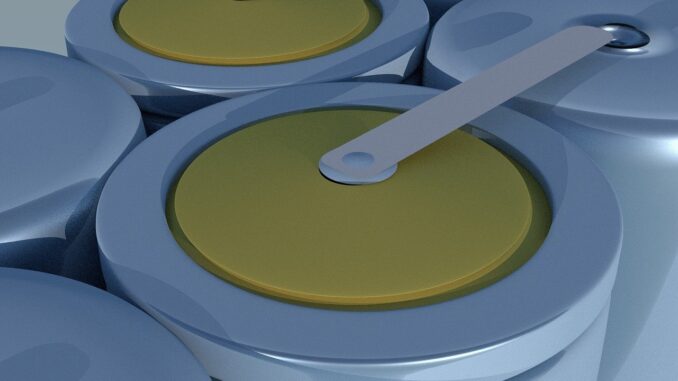
In the previous few years, India has doubled its imports of lithium-ion (Li-ion) batteries and more than tripled its import cost. According to the Union Science Ministry, Indian imports of such batteries decreased to $450 million in 2019-2020 after gradually growing in recent years to $712 million. Lithium-ion batteries are imported into India from China, Japan, and South Korea.
With China dominating the worldwide market for Li-ion cells, India hopes to avoid a repetition of what happened with solar equipment production, when China took advantage of its first-mover advantage to grab the industry.
To encourage in-house manufacturing, the government has announced a large PLI for the lithium-ion battery industry, many companies, such as Tata Chemicals, Exide, Amara Raja, have expressed interest in receiving benefits under this scheme.
The Union Cabinet established a National Mission on Transformative Mobility and Battery Storage in the NITI Aayog in 2019 to “advance clean, connected, shared, sustainable, and holistic mobility efforts” to encourage indigenous development of such batteries.
In addition, the government placed a 2.5% customs charge on inputs, components, and sub-parts used in the manufacture of lithium-ion batteries and battery packs in the most recent budget.
Now let us look into some of the key players in the Lithium-ion sector in India.
TDS Lithium-ion Battery Pvt. Ltd
TDS Lithium-ion Battery Pvt. Ltd. is a joint venture by Zuzuki, Toshiba, and Denso they have a 50%,40%, and 10% share in the venture respectively.
The three Japanese firms’ intentions highlight the Indian government’s Atmanirbhar Bharat effort to lure global businesses considering a China-plus-one production model. The government’s production linked incentive (PLI) plan for advanced chemistry cell (ACC) manufacture in India will benefit the company.
The plant, which will be the first of its kind in India for making Li-ion cells, will initially assemble battery packs before transitioning to producing Li-ion cells around 2024-25.
Exide Industries Limited
Exide Industries Ltd will begin making lithium-ion batteries, with an eye on the country’s electric vehicle (EV) industry and grid-based applications, according to a top company executive.
The country’s top lead-acid battery manufacturer signed a 75:25 split joint venture with Leclanch SA of Switzerland, one of the world’s leading energy storage solution businesses.
The joint venture factory in Gujarat is the country’s first indigenous facility for producing lithium-ion batteries and providing energy storage solutions for electric cars. The business had previously stated that it had invested about Rs 100 crore in the project and that another Rs 100 crore will be committed subsequently.
Tata Chemicals
The Tata group company, which recently demerged its fast-moving consumer products sector, also intends to do lithium-ion technology research and development to find viable applications for the domestic market, particularly the EV industry.
Tata Chemicals will play a crucial part in Tata Motors Ltd’s long-term strategy to create an electric vehicle ecosystem in India. According to them, Tata Chemicals has already purchased a property for the facility in Dholera, Gujarat’s Ahmedabad district.
“The firm plans to establish operations in li-ion batteries, battery actives, and li-recycling, to cater to the rising EV revolution in India at the right time,” according to Tata Chemicals’ FY19 annual report.
The plant is intended to help Tata Motors achieve its goal of creating a sustainable electric vehicle ecosystem.
Amara Raja Batteries
Amara Raja Batteries, the country’s second-largest car battery manufacturer, has launched the country’s first lithium-ion cell technological center in Tirupati, Andhra Pradesh.
The company’s board of directors has decided to expand its lead-acid battery business by establishing a new ‘Energy SBU,’ which will include lithium cell and battery packs, electric vehicle chargers, energy storage systems, advanced home energy solutions, and related products and services, according to a statement.
Since early 2019, the business has had a technology transfer arrangement with the Indian Space Research Organisation (ISRO). Amara Raj has already spent Rs. 20 crore on the hub, according to the CEO, discounting technology transfer and bidding costs paid to the ISRO in January 2019, when the firm and nine others won competitive bids from the national space agency.
Manikaran Power Ltd
According to Jasmeet Singh Kalsi, who is setting up India’s first lithium refinery and director of Manikaran Power Ltd, “India’s EV manufacturing would rely on imports of lithium compounds required to produce cathodes and battery cells from China. China’s lithium chemistry, battery cathode, battery cell, and electric vehicle supply chains are booming and there are none in India.”
Manikaran and Australia’s Neometals agreed to fund a feasibility study on building a lithium refinery in India with a capacity of 10,000 to 15,000 tonnes of the finished product. According to Kalsi, that capacity is insufficient to meet India’s estimated need of 200,000 tonnes of lithium hydroxide by 2030.
If they could set up a refinery it would be a game-changer for India’s EV movement.
Epsilon Advanced Materials
Epsilon Advanced Material, a maker of advanced cell chemistry materials, got its first order for anode precursor material from two major anode manufacturers in Japan and China in February of this year, qualifying it as a supplier in the global Li-ion battery supply chain.
It is India’s first lithium-ion battery components factory in the southern state of Karnataka, getting raw materials from the country’s largest steel mill. The company intends to invest 60 billion rupees ($807 million) by 2030 to create 100,000 tonnes of synthetic graphite which is roughly 10% of world demand.